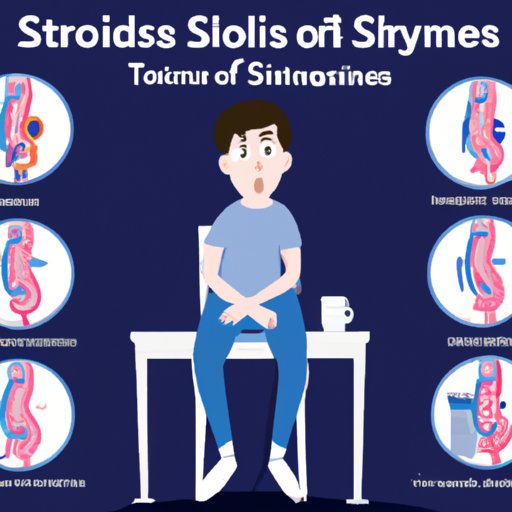
Introduction
IBS, or Irritable Bowel Syndrome, is a common digestive disorder that affects millions of people worldwide. While it’s not life-threatening, IBS can significantly impact a person’s quality of life by causing chronic abdominal pain, bloating, and changes in bowel movements. It’s important to know if you have IBS so that you can manage and alleviate your symptoms effectively. This article will explore the signs and symptoms of IBS, differentiate it from other digestive disorders, discuss common triggers and coping mechanisms, and provide personal accounts of those living with IBS.
Signs and Symptoms: How to Tell if You Have Irritable Bowel Syndrome
IBS is a chronic disorder of the digestive system that affects the large intestine, also known as the colon. There are three main subtypes of IBS:
- IBS-C, characterized by constipation
- IBS-D, characterized by diarrhea
- IBS-M, characterized by a mixture of both constipation and diarrhea
While the exact cause of IBS is unknown, it is believed to be related to the way the colon and the brain communicate with each other (1). Common signs and symptoms of IBS include:
- Abdominal pain or cramping
- Bloating or distention
- Gas or flatulence
- Constipation, diarrhea, or both
- Mucus in the stool
It’s important to note that IBS symptoms can vary in frequency, severity, and duration. Some people may experience mild, occasional symptoms, while others may have severe, persistent symptoms that significantly impact their daily lives.
IBS or Something Else? Understanding Digestive Issues and When to See a Doctor
While IBS is a common digestive disorder, it’s not the only condition that can cause these symptoms. Other conditions that may have similar symptoms to IBS include:
- Inflammatory bowel disease (IBD)
- Celiac disease
- Lactose intolerance
- Food allergies
If you’re experiencing persistent or severe digestive symptoms, you should consult a doctor. During your visit, your doctor may use several tests or exams to diagnose IBS and rule out other conditions, such as:
- Stool tests to check for infections or blood in the stool
- Colonoscopy to examine the colon and rule out other conditions
- Food allergy testing
- Blood tests to check for celiac disease or other conditions
While there’s no cure for IBS, there are several treatment options available to manage symptoms, reduce triggers, and improve quality of life
Food for Thought: Identifying Triggers and Managing Symptoms of IBS
Food can play a significant role in triggering IBS symptoms. Certain foods or drinks that may cause symptoms include:
- Caffeine
- Alcohol
- Spicy foods
- Fatty foods
- High-fiber foods
If you’re unsure which foods are triggering your symptoms, keeping a food diary can help you identify patterns. You can also experiment with a low-FODMAP diet, which eliminates certain carbohydrates that may contribute to IBS symptoms.
In addition to dietary changes, there are several lifestyle changes and therapies that may alleviate IBS symptoms:
- Exercise
- Stress management techniques, such as relaxation or meditation
- Probiotics
- Medications, such as antispasmodics or laxatives, prescribed by your doctor
The Physical and Emotional Toll of IBS: Recognizing and Coping with the Condition
IBS can also have a significant impact on a person’s emotional and mental well-being. People with IBS may experience:
- Social isolation
- Anxiety or depression
- Low self-esteem or body image
It’s important to practice self-care and seek support from loved ones or mental health professionals if you’re struggling with the emotional toll of IBS. Some organizations and resources that can offer additional information and assistance include the:
- International Foundation for Gastrointestinal Disorders (IFFGD)
- GI Society
- Crohn’s and Colitis Foundation
Living with IBS: Personal Accounts and Strategies for Coping and Finding Relief
Living with IBS can be challenging, but there are several coping mechanisms and strategies that have worked for others with IBS:
- Carrying an emergency kit with you, including items such as a change of clothes, wet wipes, and medication
- Using distraction techniques, such as reading or listening to music, to help manage pain or discomfort
- Joining support groups or speaking with others who have IBS to gain insight and support
It’s important to experiment with different strategies to find what works best for you and your unique needs.
Conclusion
IBS is a common digestive disorder that affects millions of people worldwide. It’s important to know if you have IBS so that you can manage and alleviate your symptoms effectively. This article has explored the signs and symptoms of IBS, differentiated it from other digestive disorders, discussed common triggers and coping mechanisms, and shared personal accounts of those living with IBS. Remember to seek professional help if needed and to share your experiences with others to gain insight and support.





